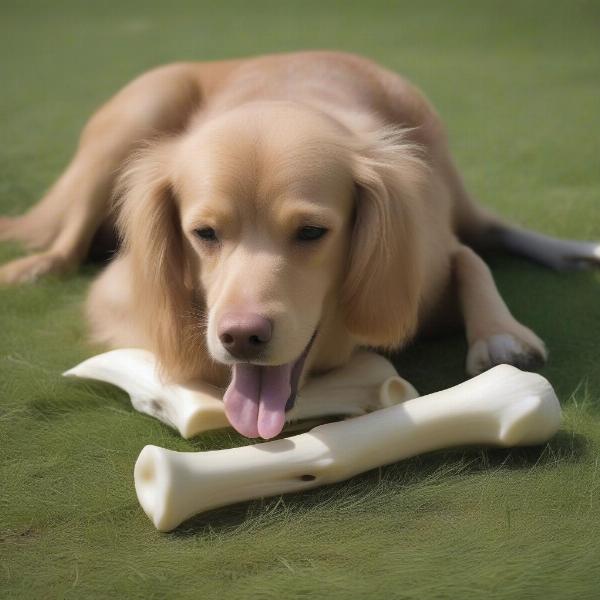Ostrich bone dog chews have become increasingly popular as a natural and long-lasting chew toy. But are they a safe and healthy option for your canine companion? This article will delve into the benefits and potential risks of ostrich bones for dogs, helping you decide if they are a suitable addition to your dog’s treat repertoire. We’ll cover everything from nutritional value and safety precautions to choosing the right size and supervising chew time.
Understanding the Appeal of Ostrich Bone Dog Chews
Ostrich bones are naturally low in fat and offer a good source of essential minerals like calcium and phosphorus. Their dense texture provides a satisfying chew that can keep dogs entertained for extended periods, helping to alleviate boredom and reduce destructive chewing behaviors. Unlike some other animal bones, ostrich bones are less likely to splinter, making them a safer alternative.
Nutritional Benefits of Ostrich Bone for Dogs
While primarily used for recreational chewing, ostrich bones offer some nutritional perks. The calcium and phosphorus content contributes to healthy bone development and maintenance. They also contain trace minerals that support overall health. However, it’s important to remember that ostrich bones should be considered a supplemental treat, not a primary source of nutrition.  A dog happily chewing an ostrich bone
A dog happily chewing an ostrich bone
Safety First: Potential Risks and Precautions
While generally considered safe, ostrich bones, like any chew treat, come with potential risks. Always supervise your dog while they are enjoying an ostrich bone. If the bone becomes too small or worn down, remove it to prevent choking hazards. Some dogs may have sensitive stomachs, so introduce ostrich bones gradually and watch for any signs of digestive upset.
Choosing the Right Size Ostrich Bone for Your Dog
Selecting the appropriate size ostrich bone is crucial for safety. A bone that is too small can be a choking hazard, while a bone that is too large can be difficult for your dog to manage and may cause jaw strain. Choose a size that is proportionate to your dog’s size and chewing strength.
Are Ostrich Bones Better than Other Bones?
Ostrich bones are often compared to other popular bone chews, like beef or marrow bones. The key difference lies in their density and tendency to splinter. Ostrich bones are denser and less likely to splinter than cooked bones, reducing the risk of sharp fragments causing internal damage. Rawhide, another common chew, is often treated with chemicals and doesn’t offer the nutritional benefits of ostrich bone.
How to Introduce Ostrich Bone to Your Dog’s Diet
Start by offering a small piece of ostrich bone under supervision. Observe your dog’s chewing behavior and monitor for any digestive issues. If your dog tolerates it well, you can gradually increase the size and duration of chew sessions. Always provide fresh water while your dog is chewing.
Conclusion: A Healthy Treat in Moderation
Ostrich bone dog chews can offer a healthy, long-lasting and enjoyable chewing experience for your canine companion. By following safety precautions and choosing the right size, you can help ensure a positive and safe chewing experience. Remember that moderation is key, and ostrich bones should be a supplemental treat, not a replacement for a balanced diet.
FAQ:
- Are ostrich bones digestible for dogs? No, ostrich bones are not fully digestible. They are meant to be chewed on for recreational purposes, not consumed entirely.
- Can puppies have ostrich bones? Yes, puppies can have ostrich bones, but choose smaller sizes specifically designed for puppies and always supervise them closely.
- What should I do if my dog swallows a small piece of ostrich bone? Monitor your dog for any signs of distress. If you are concerned, consult your veterinarian.
- How often can I give my dog an ostrich bone? Ostrich bones should be given as an occasional treat, not daily. The frequency will depend on your dog’s size, chewing habits and overall diet.
- Where can I buy ostrich bone dog chews? Ostrich bone dog chews can be purchased from pet supply stores, online retailers, and some specialty butchers.
- Are ostrich bones suitable for all dog breeds? Yes, ostrich bones are generally suitable for all dog breeds, as long as the appropriate size is chosen.
- Can I give my dog a cooked ostrich bone? No, never give your dog a cooked ostrich bone. Cooked bones become brittle and can splinter, causing serious internal injuries.
About ILM Dog
ILM Dog is your premier resource for all things canine. We provide expert advice and practical tips on dog breeds, health, training, nutrition, grooming, and much more. Our aim is to empower dog owners worldwide with the knowledge they need to provide the best possible care for their furry friends. We offer expert advice on everything from choosing the right breed to understanding your dog’s nutritional needs. Contact us for personalized guidance: Email: [email protected], Phone: +44 20-3965-8624.